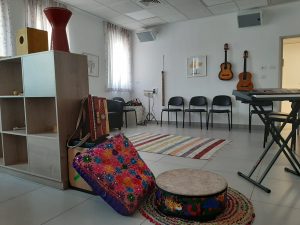Mayanei Hayeshua Medical Center
Treating the body and mind
By Alan Rosenbaum
“COVID gave us a bit of a jolt,” says Chaim Fachler, Director of International Resource Development at Mayanei Hayeshua Medical Center, with typical British understatement, “but we were one of the first community hospitals to react in an efficient and effective way.” Mayanei Hayeshua Medical Center (MHMC) is a growing 320-bed independent community hospital in Bnei Brak, and as Fachler explains, the hospital’s exemplary performance during the pandemic has helped heal both the bodies and minds of both the cared and the caregivers.
“Initially,” he continues, “the epicenter of the pandemic was in Bnei Brak.” Mayanei Hayeshua became the first hospital in the country to stop all visitors and restrict the entry of patients’ aides to the hospital. Realizing that the dangers of cross-contamination were great, the hospital built an advanced field-testing center in the hospital’s parking lot to prevent the arrival and spread of COVID within the hospital. “We acted quickly and most effectively,” says Fachler.
Mayanei Hayeshua is well-known for its expansive, six-story Mental Health Center, headed by internationally renowned psychiatrist Professor Rael Strous, that offers a range of treatments covering every aspect of human functioning.
Fachler explains that in the early days of the pandemic, infected patients felt very anxious due to their isolation, apart from medical personnel wearing special protective gear. Says Fachler, “One patient said, ‘Forget about the physical part – I am dying from isolation.” The mental health team at Mayanei Hayeshua, consisting of psychologists and social workers, entered the corona ward and spoke to patients, calmed them, and helped them cope with their feelings of loneliness. “Even more important,” continues Fachler, “the mental health staff gave direction to the regular medical staff how to speak with COVID patients, and how to make the patient feel loved and cared for – and how the staff themselves were dealing with the new situation.”
Mayanei Hayeshua’s mental health staff was also active in the aftermath of the crowd crush at Meron on Lag BaOmer, in which forty-five men and boys tragically died. “We brought in Hatzalah groups who had been there, and they were given tools to cope with that sort of mental stress they encountered. We gave direction to the carers,” says Fachler.
The pandemic has also increased the adaptation of telemedicine at Mayanei Hayeshua. The hospital had begun to introduce teletherapy on a small scale before the pandemic hit, but once patients could no longer reach the hospital for regular treatments, they implemented a more comprehensive plan. “We obtained between 50 and 60 tablets that were modified for secure medical information,” Fachler explains. “We were able to set up the system for members of the professional medical staff who had to be in isolation and couldn’t come in physically but were able to continue to treat patients through Zoom or with the medical tablets that were tailor-made for continuing treatments. We also arranged teletherapy for patients who weren’t hospitalized 24/7 but were coming in for outpatient treatments.” As an example of its effective utilization, Fachler cites the hospital’s eating disorders unit. Half of the patients in the unit remain overnight, and half are present in the hospital during the day and return home in the evenings. Because of the COVID restrictions, some of the patients could not come to the hospital during the day and were therefore treated via teletherapy.
“We were amazed to find that not only was there no reduction in the effectiveness of the treatment for those who were treated via teletherapy, but there were even occasions where because of teletherapy, we were monitoring them more hours per day than had they been in the hospital and gone home.”
Fachler says that the hospital is continuing teletherapy for patients who have been hospitalized and discharged that require monitoring.
Chaim Fachler says that Mayanei Hayeshua Medical Center has earned a well-deserved reputation for its 18 medical departments, 32 outpatient clinics and institutes, 13,000 annual births, and more than 6,000 surgical procedures performed every year.
“But our real uniqueness,” says Fachler, “lies in the cross-the-board passion of everyone who works here, from our dedicated social workers in the eating disorder unit to our professor in his 60s running the ICU. We are a community hospital, not just in name – we genuinely respond to the needs of the residents in our surrounding communities of Bnei Brak, Givat Shmuel, Petach Tikvah, and Ramat Gan. Our top priority remains – and will always remain – our patient-centered focus.





